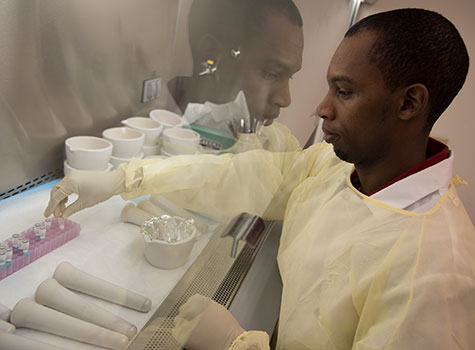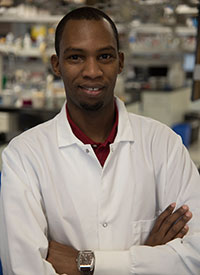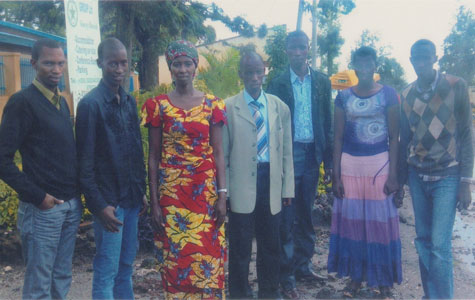
Ten years ago, when Justin Serugo was away at college in the eastern part of the Democratic Republic of Congo (DRC), a friend showed up at his dorm room one night and told him he had to hide. Rebel forces were on the campus killing young men from Serugo’s tribe, the Banyamulenge.
Serugo spent the night in his friend’s dorm room, listening to gunshots on campus throughout the night. When dawn came, he ran from the school. Corpses littered the roads. He made it across the border into Rwanda and spent three nights in a refugee camp. But the camp wasn’t safe so he moved on.
After a long journey, he ended up in Nairobi, Kenya, with a family friend. Returning to Congo and his family wasn’t safe. He stayed in Nairobi for a few years, taking computer and English classes, before he was relocated in 2008 to St. Louis through a group now called RefugePoint that works with the Office of the United Nations High Commissioner for Refugees.
Serugo, now a research technician at Washington University School of Medicine, believes he survived for a reason. “God’s grace protected me and motivates me now,” he said. “I have to have a meaningful life and achieve great things.”
At the School of Medicine, Serugo works in the laboratory of Jeffrey I. Gordon, MD, director of the Center for Genome Sciences and Systems Biology. Gordon is leading an international team aimed at developing new methods for treating and preventing malnutrition in children by targeting their developing community of gut microbes. This project is funded by the Bill & Melinda Gates Foundation.
Part of the project involves characterizing the microbes in fecal samples obtained from healthy and malnourished children living in Africa and South Asia.
After Serugo pulverizes frozen samples collected from these children and their microbial content is defined, he helps transplant these communities into the intestines of mice raised under sterile conditions. The mice are fed the same diets as the children. This work is showing how children with malnutrition have defects in the development of their gut microbial communities. The mouse models then are used to identify new food and microbial treatments to promote healthy growth in children.
Serugo also is part of a team that takes care of 800 mice in sterile conditions. His direct supervisor, research lab manager Maria Karlsson, said Serugo rapidly has become an invaluable member of her team. “We couldn’t do our work without him.”
“Justin is extremely bright, an eager and quick
learner, a kind and gracious person and someone who is very committed
to his work and the success of this project,” said Gordon, the Dr.
Robert J. Glaser Distinguished University Professor. “We continue to
find new ways that he can contribute in important ways to our research. ”

Serugo grew up with three brothers and three sisters in a mud hut in the South Kivu province of Congo. His father is a pastor in a Christian church. Serugo attended school and church, played soccer and guarded the livestock at night to protect it from neighboring tribes.
For almost 20 years, war has raged in his homeland. Almost 5 million people have died because of the conflict, famine and disease. Many of Serugo’s tribe, the Banyamulenge, were killed in what is referred to as the Gatumba Massacre in Burundi. Of his 11 childhood friends, only he and one other man still are alive.
When Serugo arrived in St. Louis, after flying on an airplane for the first time, he was surprised when he saw his apartment. “Everyone in Africa believes that in America you will have a computer, a car and a house,” he said. “It wasn’t true. It also was very lonely because I didn’t speak English very well. But I am happy to be alive.”

Serugo worked in housekeeping at a hotel and a casino before he landed a job cleaningmice cages at WUSM in 2011. His hard work led to his promotion last year to research technician and his hiring by Gordon to work on the childhood malnutrition project. He also has started a side commercial and residential cleaning business to give refugees jobs when they first get to St. Louis.
Serugo supports his six siblings, who live in Uganda and have trouble finding work because they are refugees. One of his dreams is to find a way for them to move to the United States. His parents remain in Congo, but it is unsafe for his brothers and sisters to return home.
“Many people in the United States don’t realize how many opportunities they have to work and make their lives better,” said Serugo, who became a U.S. citizen earlier this year. “I’m so grateful for the opportunities I have had and hope that I can bring my family to the United States someday, too.”